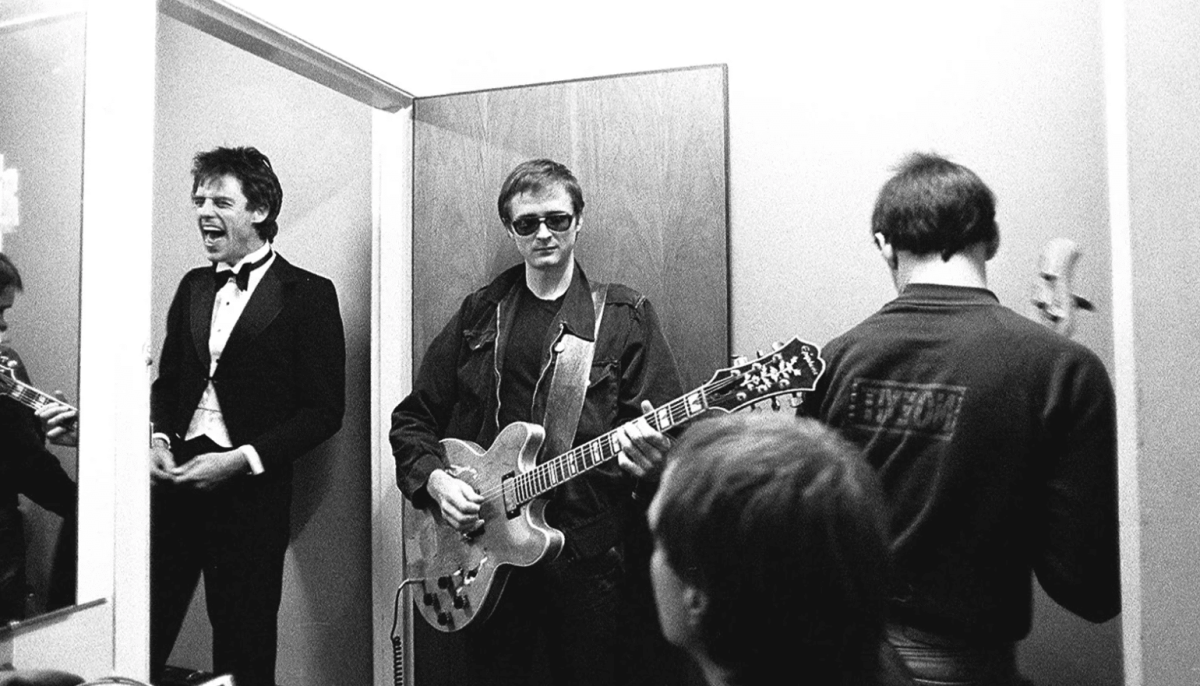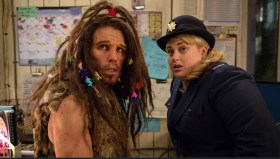The Angels: Kickin’ Down the Door is an Australian documentary made by Madeleine Parry, who has worked herself into prominence over ten years with shorter documentary projects which involve some combination of directing, writing and presenting. She directed two Hannah Gadsby specials that run on Netflix.
The band started as The Keystone Angels in Adelaide in 1974, and condensed around Doc Neeson as a hard-driving outfit became a key hard-driving outfit with domestic love and international respect. It split, reformed, split and reformed, and finally lost traction through the slow deaths of band members. There is love for them still, and fans who revel in its ability to shape music history, while the film also plays neatly with the form.
Amazingly, there are almost no reviews – except for Stephen A Russell on ScreenHub, who wrote:
‘Any band that has ever packed out a heaving room full of sweating, beer-soaked bodies moshing in the stink will always hold some small part of those beating hearts forever after. That much was clear to me as I stood on the grass verge that slopes down from the arched cloisters of the University of Adelaide in August, looking out to the floodlit stage where the latest incarnation of local rock legends The Angels were blaring out their brilliance. As I stood there, I saw a woman haul over a chair, stand up on it, lighter sparking in the darkness, totally lost in the moment. A vision of her teenaged self captured in amber.’
Read: The Angels: Kickin’ Down the Door shows a legacy undimmed
The Angels: Kickin’ Down the Door made $68,000 off 86 screens in its first weekend.
Meanwhile, Australian film Seriously Red has kept almost all of its screens for week two, though it lost 39% of its weekend returns. It has now made $528,000 as distributor Roadshow pushes against the generally low audience numbers for the pre-Xmas lull.
The box office list
Black Panther: Wakanda Forever is in week four. Last weekend it made an impressive $1.83m, though that is a low, low figure to top the leaderboard. It has made $25.23m altogether, and $1.078 billion around the world.
The second slot fell to that gruesomely cumulative satire of culinary culture, The Menu. In week two, it occupied 338 screens to make $667,000, with $2.24m altogether, as a modest contribution to $70m around the world off a $4m budget.
Violent Night, the action comedy in which Santa fights off a band of mercenaries, arrived in third place, with 297 screens and $659,000. Over the same period it made $10m in the US and $30m around the world, so the audience has a minor taste for violent fun. According to Deadline, it is doing better than expected in a very dull audience lull.
Proof of that attack of the snores is provided by the fate of the other films released last weekend in Australia. HIT: the 2nd Case, is a Teluga slasher film which took $121,000 in eighth place; Neil Young: Harvest Time made $94,000 in slot 13; Spanish kids’ animation Little Eggs: An African Rescue made $57,000 off 169 screens. That is not as bad as it looks because it will work well in the day sessions and will hang in over Xmas.
Kompromat is a French Palace release, drilling its way into our arthouse circuit with fine reviews and a refreshing genre – it is a contemporary espionage thriller related to true events torn from the headlines. It has a modest release on 22 screens, made $127,000 in week one and will probably hang in for some time.
Margrete: Queen of the North blew me away a few days ago with an impeccable story about medieval Scandinavian royal politics. It has many of the best players from Scandi-noir, every available castle on a remote surf-pounded coast, and a grown up story. The reward is 23 screens, $26,000 in weekend two, and $204,000 altogether.
Next weekend
Some interesting films have snuck in here to take advantage of the soggy mainstream competition. Neptune Frost is a Swahili dystopian SF romance musical, a ‘blazingly original mood piece about humanity, technology, the Earth and our spirits and how they all tangle in rhythm, or out of rhythm, with each other’, according to the Detroit News. As Collider points out, there are plenty of ideas beneath the surface zest.
There is a tumble of good reviews on Rotten Tomatoes, interspersed with a few people in minor pain, but my favourite line comes from ScreenHub: ‘If Black Panther‘s afro-futurism being presented under the traditional, capitalist grip of Marvel made you cringe, then Neptune Frost is the movie for you.’
Read: Neptune Frost, Saul Williams MIFF review
Moja Vesna is actually an Australian film, written and directed by Slovenian-Australian Sara Kern, born and trained in Slovenia, and now based in Melbourne.
The film ran in the 2022 Berlin Film Festival in the Generation K-Plus category. It is about ten year old Moja, who is trying to keep her wrecked family afloat after the loss of her mother. As the festival writes:
‘With a delicate, meticulous grasp of interpersonal dynamics and the large significance of small gestures, writer and director Sara Kern’s impressive feature debut tells a compassionate tale of loss and solace.’
It has major institutional support here, and Time Out and FilmInk do the honours in the reviews.
Gold is an Australian dystopian(ish) thriller directed by actor Anthony Hayes and written by Polly Smyth and Hayes. It has been on Stan all year, but has now brought its grippy, sweaty aesthetic to the big screen.
Our readers might want to dash towards White Noise, based on the 1985 Don DeLillo novel directed by the respected Noah Baumbach from his own screenplay. Described as an apocalyptic black comedy, it has been released by Netflix before a streaming debut at the end of the month.
The official big deal film this weekend is Tad the Explorer: The Mummy Adventure, which turns out to be not another sand-and-bandage time-sink but a Spanish animation for kids, which has been well reviewed by people who claim to understand the demographic.
The Road Dance is Scottish, with performances that most critics love, looks beautifully Hebridean – and the road dance itself celebrates the last night at home of conscripts bound for Flanders.
Ennio: The Maestro is a documentary about Ennio Morricone by Guiseppe Tornatore. Don’t expect shattering revelations but it will be a heap of fun.





